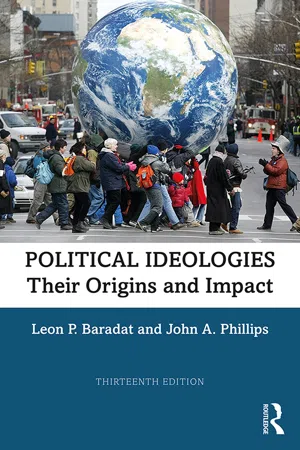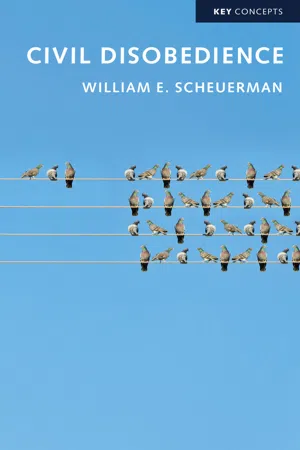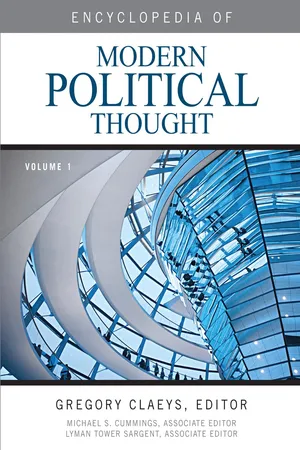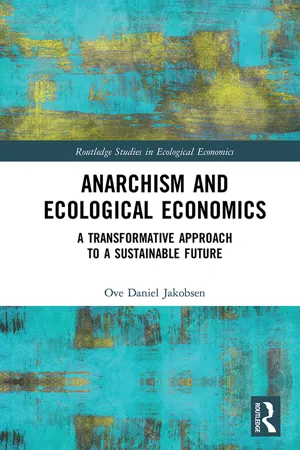Individualist Anarchism
Individualist anarchism is a political philosophy that emphasizes individual freedom and autonomy, rejecting the authority of the state and other hierarchical institutions. It promotes voluntary cooperation and mutual aid as the basis for social organization, and advocates for a society based on voluntary associations and decentralized decision-making. Individualist anarchists often prioritize personal responsibility and self-reliance, while opposing coercion and domination.
5 Key excerpts on "Individualist Anarchism"
- eBook - ePub
Political Ideologies
Their Origins and Impact
- Leon P. Baradat, John A. Phillips(Authors)
- 2019(Publication Date)
- Routledge(Publisher)
...CHAPTER 7 Anarchism Preview Arising from a reaction to the growing power of government and the increasing influence of capitalism, anarchism developed among a small but highly motivated number of people. Poorly understood in our society, anarchism is the purest expression of individualism in political thought. Anarchists of all sorts see institutional government as an impediment to human progress and wish to eliminate it in part or even completely. Agreeing that government should be limited, anarchists tend to disagree on matters of substance and on tactics. Social anarchists—those on the left—wish to free individuals from governmental restraint so that individuals can do the greatest good possible for society as a whole. By contrast, individualist anarchists—those on the right of the political spectrum—seek to limit government so that individuals can accomplish the greatest good for themselves alone. Anarchists can be left-wingers or right-wingers, pacifistic or violent, devout or atheistic, socialist or capitalist. Indeed, except for the reduction or elimination of institutional government, there are few things on which anarchists agree. Currently, anarchism is becoming fashionable among certain elements in the American public and others. The militant right-wing groups threaten insurrection in defense of their individual liberties, some extreme Tea Party enthusiasts as well as some extremist libertarians want to severely curtail government in protection of individual liberties, and some leftists are also drawn to anarchism in an effort to combat what they regard as the emergence of a super-government controlled by international corporations. Development of Anarchism Even as the imperatives of the Industrial Revolution motivated some people to seek more popular participation in government, others agitated for social organization without institutional government...
- eBook - ePub
- William E. Scheuerman(Author)
- 2018(Publication Date)
- Polity(Publisher)
...4 Anarchist Uprising Previous chapters examined rival models of civil disobedience. Our approach here differs: we consider the most wide-ranging challenge to civil disobedience as conceived and practiced by activists and intellectuals extending from Gandhi to Habermas. Since the 1980s many writers on political disobedience have embraced theoretical or philosophical anarchism, with anarchist philosophical reflections offering an imposing critical retort to conventional ideas of civil disobedience. Political anarchism has also enjoyed a renaissance, with anarchist activists playing a pivotal role in recent social movements (for example, the global justice and Occupy movements). Anarchists come in multiple shapes and sizes. All anarchists reject the modern state, viewing it as basically illegitimate and complicit in a wide range of social and material injustices. As per conventional scholarly wisdom, we distinguish political from philosophical anarchists. 1 The former includes its most audacious historical figures (for example, Mikhail Bakunin, Pjotr Kropotkin, and Emma Goldman) as well as present-day anarchists who take to the streets motivated by the goal of jettisoning the state in favor of some presumably superior non-statist social order, to be constructed on voluntary and consensual ties. Political anarchism comes in both communalist and radically individualistic forms. In the simplest terms: the political anarchist pursues militant illegal action to destroy the state and other institutions incongruent with her preference for spontaneously organized, self-governing communities. In contrast, philosophical anarchists “do not take the illegitimacy of states to entail a strong moral imperative to oppose or eliminate states; rather, they typically take state illegitimacy to remove any strong moral presumption in favor of obedience to, compliance with, or support for our own or other existing states” (Simmons 1996: 20)...
- eBook - ePub
- Gregory Claeys(Author)
- 2013(Publication Date)
- CQ Press(Publisher)
...Ruth Kinna Ruth Kinna Anarchism Anarchism 30 33 Anarchism Anarchism is a worldwide movement that has its ideological origins in the French Revolution, though the principles that inspire the political ideology are frequently identified in a range of earlier and not exclusively European schools of thought. Anarchism also describes a way of thinking or a set of attitudes, linking political movements narrowly understood, to creative currents in literature, science, the arts and humanities. Pierre-Joseph Proudhon was the first writer to use the term anarchy to describe his political ideal, knowing that it was already associated with chaos, social disorder, and violence. Anarchists have had cause to regret his decision ever since because for them, anarchy conjures images of precisely the opposite conditions; the familiar graffiti that places the A inside the O symbolizes the integral relationship they identify in anarchy and order. One of the hallmarks of anarchism is the celebration of diversity and the reluctance on the part of many (though not all) to define its theoretical principles. Anarchists tend to be resistant to the idea that anarchism might be attached to one concept or ideal (e.g., the priority of liberty, classlessness), and their reluctance has encouraged a proliferation of labels within the movement. It is not unusual to find reference in anarchist literatures to social anarchism, anarcho-communism, anarcho-syndicalism, class-struggle anarchism, or anarcha-feminism, and sometimes more contentious forms such as market-anarchism or anarcho-capitalism. The ideological parameters of these different forms, their interrelationship and the definitional role that any might claim to have had in the construction of the anarchist tradition, still generate considerable debate. In contemporary anarchism, these debates have been deepened by the appearance of two further currents...
- Gary Chartier, Chad Van Schoelandt, Gary Chartier, Chad Van Schoelandt(Authors)
- 2020(Publication Date)
- Routledge(Publisher)
...Moreover, many political philosophers have been concerned with understanding problems that individuals within anarchic arrangements would face in order to understand the role, justification, and appropriate limits of the state. This book is designed to deepen understanding of anarchy—among both scholars and thoughtful non-academic readers—at a time when anarchist ideas have attracted considerable attention. Discussions of anarchy as an analytical model in economics, political science, and international relations theory and as a normative model in legal and political philosophy have been matched by growing interest in anarchist ideas in the political sphere. In the United States, for instance, the Ron Paul movement propelled many of those who originally embraced it beyond electoral politics and into support for anarchy. Opposition to corporate-led globalization during the Seattle protests against the World Trade Organization embraced anarchist symbols and values. The Occupy movement embraced a self-consciously anarchist flavor, drawing inspiration from anarchist anthropologist David Graeber and praise, indeed, from Ron Paul. And less dramatic anti-authoritarian attitudes find expression in increasingly vocal challenges to the drug war and to state policing. Globally, the policies embraced by many governments to the Sars-Cov-2 pandemic have prompted theoretical anarchist critiques and practical anarchist responses—involving the development of alternatives to state service provision and push-backs against restraints on civil and economic liberties. 4 In the United States, the renewed attention to police violence prompted by the murder of George Floyd has also led to on-the-ground activism and critiques of state provision of security services, both with anarchist undertones or explicit anarchist content. At the same time, libertarian ideas of various sorts are gaining increasing exposure in academe...
- eBook - ePub
Anarchism and Ecological Economics
A Transformative Approach to a Sustainable Future
- Ove Daniel Jakobsen(Author)
- 2018(Publication Date)
- Routledge(Publisher)
...5 History of anarchist philosophy Introduction The anarchists present a political and economic framework that could be characterized as utopian because it represents a standpoint that is distanced from what we find today. This brief overview of the history of anarchist philosophy ranges from Goodwin to Chomsky. Anarchism distances itself from both liberalism and Marxism by arguing that liberalism is too focused on the individual and forgets the collective, while the Marxists are too focused on the collective and forget the individual. Anarchism gives priority to individual freedom in solidarity. In other words, the good life in solidarity with the collective. In 1909 Kropotkin formulated the question that anarchism asks in the following way: “What forms of social life assure to a given society, and then to mankind generally, the greatest amount of happiness, and hence also vitality?” (Kropotkin 1909, p. xx) One hundred years later, in 2008, Marshall stated that “If there is no joy, imagination, spontaneity, conviviality and fun, it isn’t my free society” (Marshall 2008, p. xx). Anarchy is far from being a new position in political philosophy. The word itself is of ancient origin. Anarchy is derived from Greek, “anarchos”. The pronoun “an” means, in this context, “without”, and the following word “archos” denotes ruler or authority. Hence, anarchy means “without ruler”, or more precisely, alternatives to and absence of such types of governance based on leaders and followers, i.e., the absence of hierarchy and authority. It is the condition of a people governing themselves without a constituted authority. Classical anarchism According to Marshall, it would be difficult to offer an exact definition of anarchism, since by its very nature it is a complex and subtle philosophy, embracing many different ideas and thoughts. At first sight it seems a hopeless task to incorporate anarchist theory into one general ideology...




